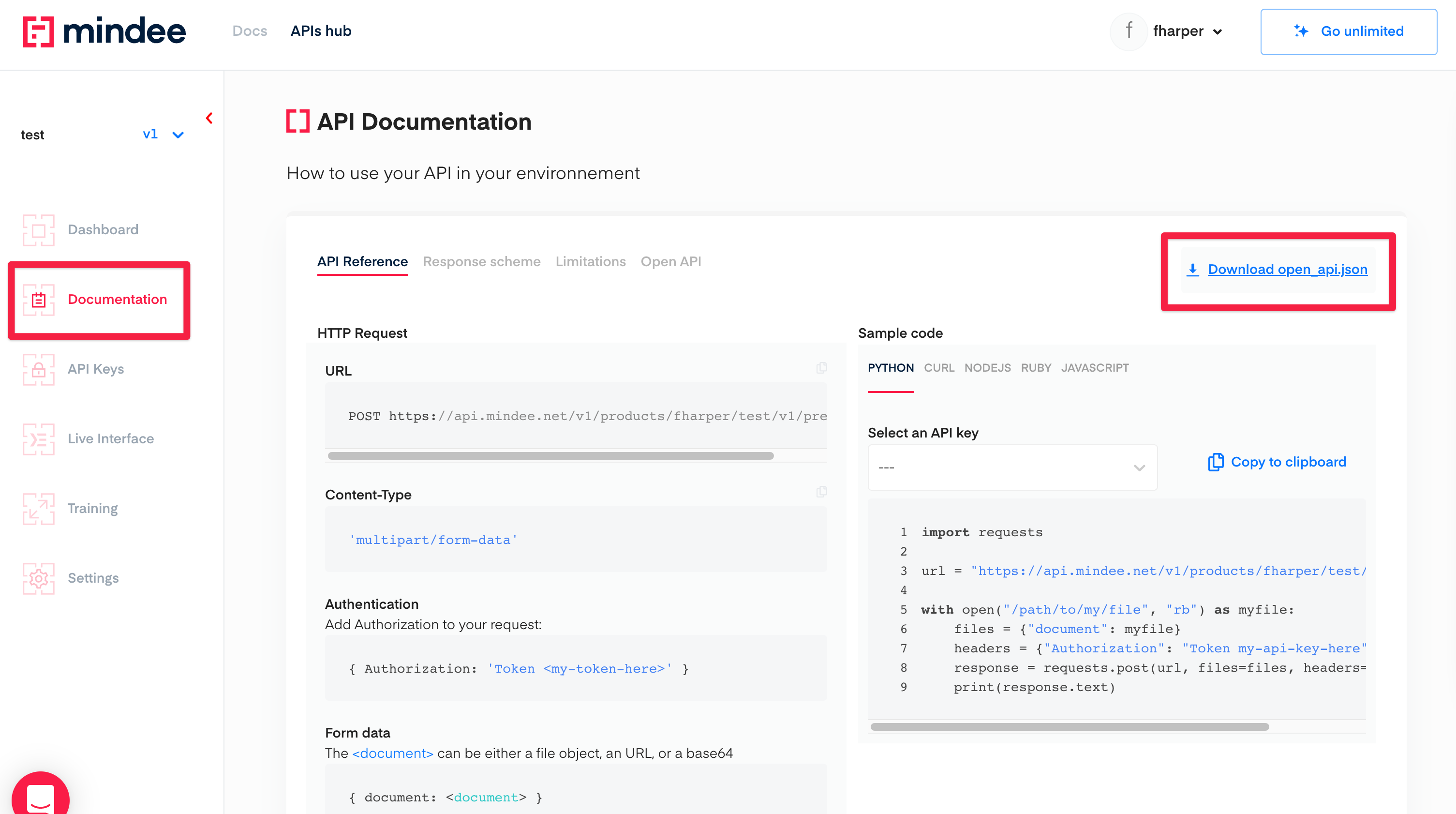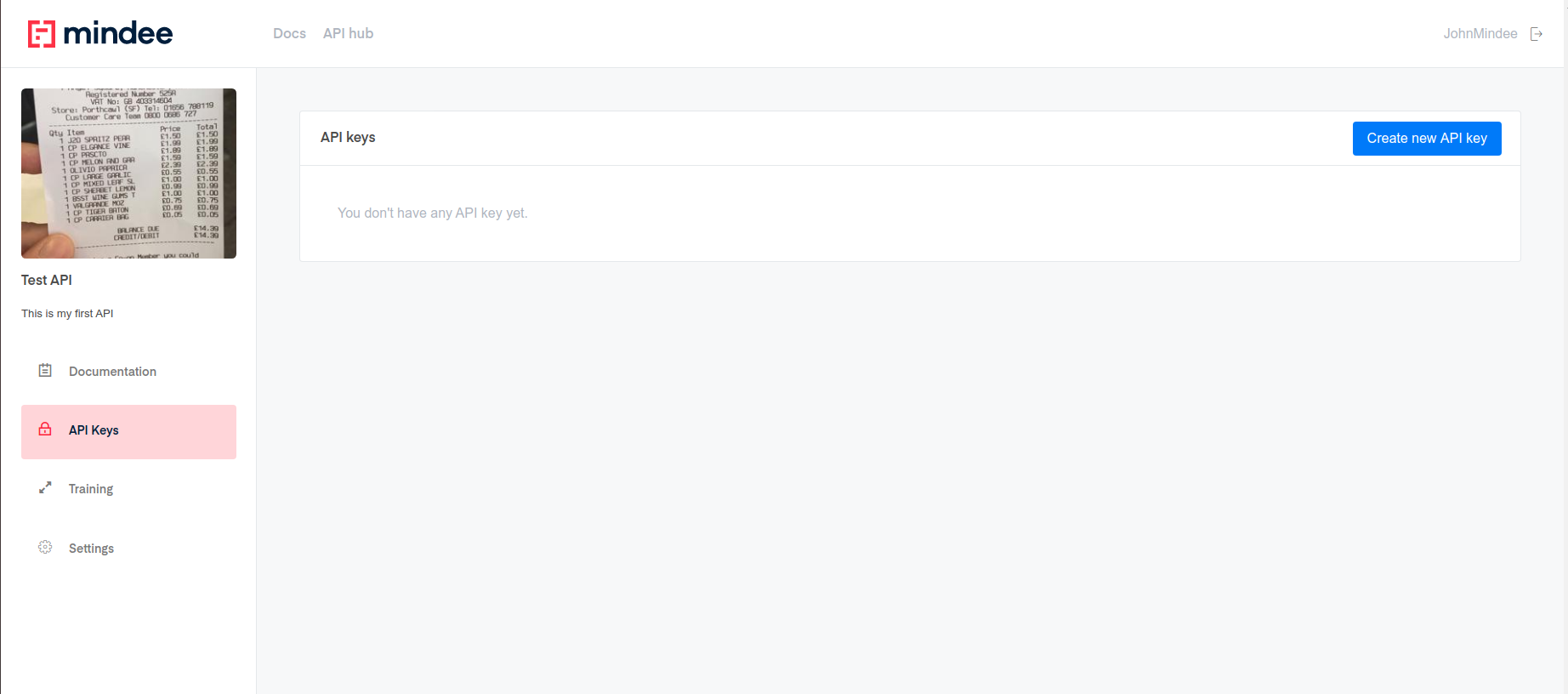Generate your Clients
Generate your client from Swagger json
In this tutorial, you'll learn how to generate your client library using an Open API configuration. We're going to generate a python client but you can use the same library to generate your client in many languages.
Code generation
Python
First you will need to download the latest swagger-codegen-cli version from maven central :
https://repo1.maven.org/maven2/io/swagger/swagger-codegen-cli/.
Make sure to have java installed in your computer by running the following command :
foo@bar:~$ java -version
openjdk version "11.0.9.1" 2020-11-04
OpenJDK Runtime Environment (build 11.0.9.1+1-Ubuntu-0ubuntu1.18.04)
OpenJDK 64-Bit Server VM (build 11.0.9.1+1-Ubuntu-0ubuntu1.18.04, mixed mode, sharing)
Download the open_api.json file from the documentation page of your Mindee project (in your project click the "Documentation" tab:

Run this command to generate the code by replacing openapi.json with the name of the JSON file you just downloaded.
foo@bar:~$ java -jar swagger-codegen-cli-version.jar generate -i openapi.json -l python -o your_api_client
You can now install your python sdk client :
Create a virtual env :
foo@bar:~$ python3 -m venv python_sdk_client_venv
foo@bar:~$ source python_sdk_client_venv/bin/activate
You can ignore this step if you are already using your own python3 virtual env.
Install your python sdk client via setuptools:
(python_sdk_client_venv) foo@bar:~$ cd your_api_client/
(python_sdk_client_venv) foo@bar:~$ python setup.py install
You are all set and ready to use your Python SDK client.
Python Usage
Create your api key from the API Keys page of your Mindee project:

Using the predict endpoint
import swagger_client
from swagger_client.rest import ApiException
# replace XXX by your public api name in camel-case/
# for example, if your api is named api_name, replace XXXApi() by ApiNameApi()
api_instance = swagger_client.XXXApi()
authorization = "xxxxxxxxxxxxxxxxxxxxxxxxxxxxxxxx" # your api key
version = "v1" # choose your version
file = "path/to/your/file"
feedback = "true"
try:
api_response = api_instance.upload_file(
authorization, version, file, feedback=feedback
)
except ApiException as e:
raise e
- api_response is an object of type swagger_client.models.api_predict_response.ApiPredictResponse.
api_response.input_uuid # if you set feedback to 'true'
api_response.pages
api_response.predictions
- api_response.pages.features is a list containing all the candidates the API found for each field. Each item of the list corresponds to a page:
{
'pages': {
'candidates': [
{
'feature_1': [
{
'content': 'xxxx',
'key': 'f0311d47',
'segmentation': {
'bounding_box': [
[
0.2891,
0.0264
],
[
0.4479,
0.0215
],
[
0.4505,
0.0635
],
[
0.2917,
0.0684
]
]
}
]
}
]
....
],
'feature_2': ....
}
}
- api_response.predictions is a dict: containing the model's predictions for each feature. Note that if you're using the v0 version of your API, this object will be set to None as there is no trained model yet.
{
'feature_1': [
{'content': 'xxx',
'key': 'c5d1daf7',
'page_id': 0,
'relative_vertices': [[0.0898, 0.0693],
[0.2708, 0.0635],
[0.2734, 0.1035],
[0.0924, 0.1094]]
}, ....
]
'feature_2': ....
}
Questions?
![]() Join our Slack
Join our Slack
Updated about 2 months ago
